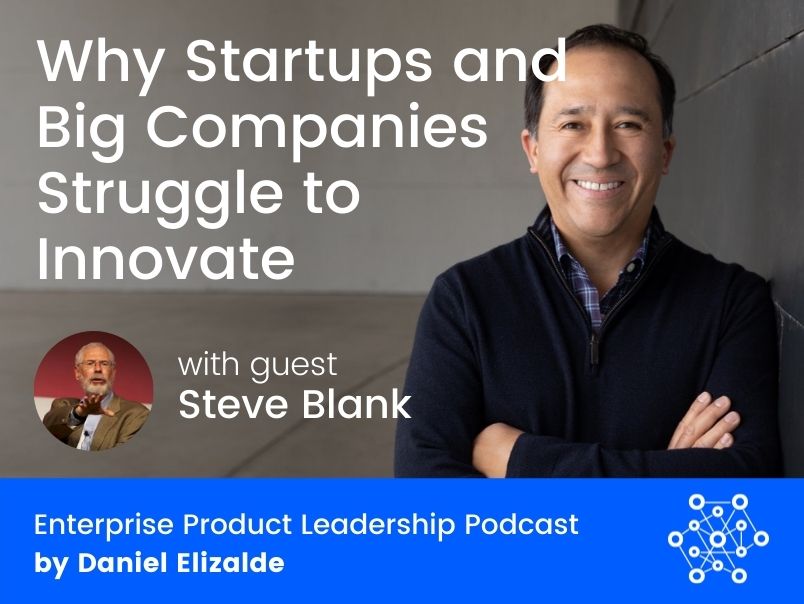
Subscribe to the podcast on Apple Podcasts | Android | Stitcher | Spotify
Episode Details – Why Startups and Big Companies Struggle to Innovate with Steve Blank
The Lean Startup movement is integral to the foundation of modern entrepreneurship. Yet, despite its proven success, many businesses, including both startups and established companies, struggle to apply Lean principles and continue to build products through the waterfall approach.
My guest today is Steve Blank, author, professor, and father of the Lean Startup movement. In our discussion, Steve reflects on the current state of innovation in startups and enterprises and shares his advice on what can be done to improve it. You’ll also hear what it means to be an ambidextrous organization and why Steve holds it in such high regard.
As we dive into the premise of Lean, Steve explains why on your first day as a startup, all you have is a series of untested hypotheses, whereas for an established organization the departure point is from a series of knowns. Later we discuss the concept of innovation theatre and why it’s more prevalent in established companies. We discussed why the same processes for innovation that do well in startups, doesn’t work well for large organizations.
Steve also shares examples of how the VP of sales can undermine innovation and why senior leadership in large organizations generally needs a lot of reform.
Steve Blank has been a big influence in my Product career, so I can’t tell you how excited and honored I am to have Steve on the show. This is a very insightful episode that no Product Leader should miss!
About Steve Blank
Steve Blank is an Adjunct Professor at Stanford and Senior Fellow for Innovation at Columbia. He has been described as the Father of Modern Entrepreneurship. Credited with launching the Lean Startup movement, the curriculums for the National Science Foundation Innovation Corps, and Hacking for Defense and Diplomacy, he’s changed how startups are built, how entrepreneurship is taught, how science is commercialized, and how companies and the government innovate.
Steve is the author of The Four Steps to the Epiphany and The Startup Owner’s Manual, which revolutionized how startups were built– and his May 2013 Harvard Business Review cover story redefined how large companies can innovate at speed. Steve’s latest class at Stanford is Technology, Innovation and Modern War, which is providing crucial insight on the impact of commercial technology on the future of warfare. Steve blogs at www.steveblank.com.
Key points from this episode
- The current state of innovation in startups and enterprises.
- What it means to be an ambidextrous organization.
- Why startups still tend to have a technology-first approach rather than a customer-first one.
- The departure point for the premise of Lean is that on your first day as a startup, all you have is a series of untested hypotheses.
- In an established organization, the departure point is from a series of knowns, like your existing customer needs, your supply chain, etc.
- Why founders are often too certain and why it’s a problem.
- Finding a repeatable and scalable business model as a startup.
- A discussion on the concept of innovation theatre.
- Steve shares an anecdote explaining the ‘cargo cult’ to illustrate how large corporations misjudge what it means to have a Lean approach.
- Why large organizations can withstand innovation theatre for longer than a startup.
- Why senior leadership needs to be reformed.
- How the VP of sales can undermine innovation in a company.
- How Steve describes an innovation doctrine or an innovation pipeline and how to construct and adopt it.
To learn more about Steve Blank
Want to learn more?
- Sign up for my newsletter at DanielElizalde.com/Join for weekly advice and best practices directly to your inbox!
- Visit DanielElizalde.com/Podcast for additional information, show notes, and all episodes.
- Subscribe on Apple Podcasts so you don’t miss out on any of my conversations with Product and Thought Leaders!
1 Comment
-
This podcast gives a clear travel to the full Lean Startup method and the impact in how to implement innovation in any size of company.
I had listen a lot of times to Steve Blank, but this issue has the best synthesis I ever listen
Thanks for sharing
Jorge Zavala